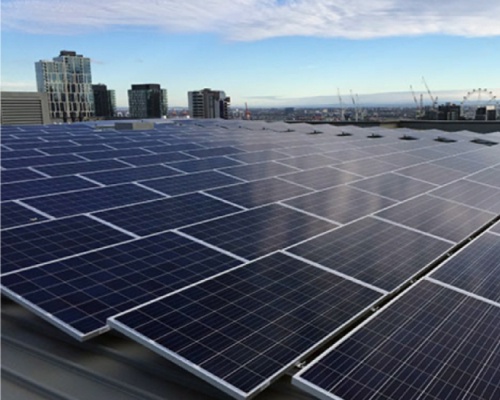Rooftop solar panel systems have gained popularity as a sustainable and renewable energy source for residential and commercial buildings. While their cost-saving benefits are well-documented, it is equally important to understand the positive environmental impact of these systems. This comprehensive guide will delve into the various ways rooftop solar panels contribute to a greener planet and help mitigate climate change.
Reduction in Greenhouse Gas Emissions
One of the most significant environmental benefits of rooftop solar panel systems is their ability to reduce greenhouse gas emissions. Traditional electricity generation methods, such as coal and natural gas power plants, release substantial amounts of carbon dioxide (CO2) and other pollutants into the atmosphere. Solar panels, on the other hand, generate electricity without emitting any greenhouse gases during operation.
By harnessing the power of sunlight to produce electricity, rooftop solar panels help mitigate the carbon footprint associated with electricity consumption. The reduction in CO2 emissions varies depending on the size of the solar panel system and the local energy mix, but it can be substantial over the system's lifespan, which typically exceeds 25 years.
Energy Independence and Reduced Fossil Fuel Dependency
Rooftop solar panel systems promote energy independence by allowing homeowners and businesses to generate their electricity. This self-reliance reduces dependence on fossil fuels, which are finite resources associated with environmental degradation and geopolitical conflicts.
As more individuals and organizations adopt solar energy, the demand for fossil fuels decreases. This, in turn, can lead to reduced extraction, transportation, and combustion of fossil fuels, resulting in fewer greenhouse gas emissions, air and water pollution, and habitat destruction.
Conservation of Natural Resources
Traditional electricity generation relies on the extraction and consumption of finite natural resources, such as coal, natural gas, and uranium. These processes can have detrimental environmental impacts, including habitat destruction, water pollution, and soil contamination.
Rooftop solar panels, on the other hand, require minimal resources for manufacturing and installation, and they generate electricity without depleting non-renewable resources. By choosing solar energy, individuals and businesses contribute to the conservation of these vital resources and help protect ecosystems.
Reduction in Air and Water Pollution
Conventional power plants emit pollutants, including sulfur dioxide (SO2), nitrogen oxides (NOx), and particulate matter, which can have detrimental effects on air quality and public health. These pollutants contribute to smog formation, respiratory diseases, and other health issues.
Solar panels, in contrast, produce electricity without emitting any air pollutants. This not only improves air quality but also reduces the negative health impacts associated with exposure to air pollution. Additionally, the production of solar panels involves fewer hazardous chemicals and pollutants compared to the manufacturing of fossil fuel-based energy infrastructure.
Furthermore, the cooling systems used in many power plants require substantial water resources for cooling purposes. The discharge of heated water back into natural water bodies can harm aquatic ecosystems. Rooftop solar panels do not require water for cooling, which helps conserve this precious resource and reduces the strain on freshwater ecosystems.
Mitigation of Urban Heat Island Effect
Urban heat islands (UHIs) are areas within cities that experience higher temperatures than their surrounding rural areas due to human activities and heat-absorbing surfaces like asphalt and concrete. Rooftop solar panels can mitigate the UHI effect by providing shade and reducing the amount of solar energy absorbed by buildings.
When solar panels are installed on rooftops, they create a cooling effect by shading the building's surface. This, in turn, reduces the need for air conditioning during hot summer months, leading to energy savings and a decrease in greenhouse gas emissions from cooling systems.
Promotion of Biodiversity
Solar panel installations can be designed to coexist with local ecosystems and promote biodiversity. Some solar farms incorporate practices like planting native vegetation around the panels and creating wildlife habitats within the solar arrays. These measures not only support local wildlife but also contribute to the overall health of the environment.
Furthermore, by reducing the demand for land for fossil fuel extraction or large power plants, rooftop solar panels can help protect natural habitats from fragmentation and degradation. This conservation of open space benefits both terrestrial and aquatic ecosystems.
Sustainable Materials and Recycling
Solar panel manufacturers have made significant strides in using sustainable materials and reducing the environmental impact of panel production. Many modern solar panels are made using materials that have a lower environmental footprint, and production processes have become more energy-efficient.
Additionally, the solar industry has developed recycling programs to ensure that solar panels are disposed of responsibly at the end of their life cycle. Recycling allows for the recovery of valuable materials and reduces waste, further contributing to the sustainability of solar energy.
Technological Advancements and Efficiency
Advancements in solar panel technology have led to increased efficiency and reduced environmental impact. Higher-efficiency panels generate more electricity from the same amount of sunlight, resulting in a smaller environmental footprint per unit of electricity produced. These technological improvements continue to make solar energy an even more environmentally friendly choice.
Rooftop solar panel systems offer a multitude of environmental benefits that extend beyond their cost-saving advantages. These systems reduce greenhouse gas emissions, promote energy independence, conserve natural resources, and improve air and water quality. Additionally, they mitigate the urban heat island effect, support biodiversity, and rely on sustainable materials and recycling practices.
As technology continues to advance, the environmental impact of rooftop solar panels is expected to further decrease while their efficiency and accessibility improve. Embracing solar energy is not only a responsible choice for homeowners and businesses but also a significant contribution to a more sustainable and environmentally friendly future for our planet.


No comments yet